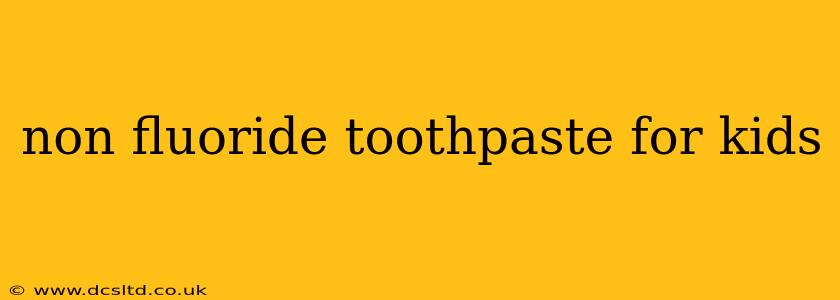Choosing the right toothpaste for your child can feel overwhelming, especially when considering the fluoride debate. Many parents opt for non-fluoride toothpaste for their kids, driven by concerns about fluoride's potential effects or simply a preference for natural ingredients. This guide provides a comprehensive overview of non-fluoride toothpaste for kids, addressing common questions and concerns.
What are the Benefits of Non-Fluoride Toothpaste for Kids?
Some parents choose non-fluoride toothpaste primarily due to concerns about potential fluoride ingestion. While fluoride is beneficial in preventing cavities when used topically, excessive ingestion can lead to fluorosis, a condition that can affect tooth enamel. Other parents prefer non-fluoride options due to a preference for natural and organic ingredients, avoiding artificial sweeteners, colors, and preservatives often found in conventional toothpastes. Finally, some children may have sensitivities to fluoride, making non-fluoride a more suitable choice.
Is Non-Fluoride Toothpaste Effective?
The effectiveness of non-fluoride toothpaste in preventing cavities is a topic of ongoing discussion. While it doesn't offer the cavity-fighting benefits of fluoride, many non-fluoride pastes contain other ingredients that can aid in cleaning and maintaining oral hygiene. These ingredients might include xylitol (a natural sweetener shown to inhibit bacteria growth), calcium, and other natural abrasives for cleaning. However, it's crucial to remember that non-fluoride toothpaste is not a replacement for regular dental check-ups and fluoride treatments recommended by a dentist.
What Ingredients Should I Look For (and Avoid) in Non-Fluoride Kids' Toothpaste?
When selecting a non-fluoride toothpaste for your child, prioritize natural ingredients and avoid artificial additives. Look for toothpastes that contain:
- Xylitol: A natural sweetener with cavity-fighting properties.
- Calcium: Essential for strengthening tooth enamel.
- Gentle abrasives: These help remove plaque without damaging enamel (check the RDA – Relative Dentin Abrasivity – value).
- Natural flavors and sweeteners: Avoid artificial colors and flavors.
Avoid toothpastes containing:
- Sodium lauryl sulfate (SLS): A foaming agent that can cause irritation in some children.
- Artificial sweeteners: Aspartame, saccharin, etc.
- Artificial colors and flavors: These can be unnecessary and potentially harmful.
How Often Should My Child Brush With Non-Fluoride Toothpaste?
The brushing frequency remains consistent whether using fluoride or non-fluoride toothpaste: twice daily for at least two minutes. Supervise young children closely to ensure they're brushing effectively and not swallowing the toothpaste.
When Should I Start Using Fluoride Toothpaste?
The American Dental Association (ADA) recommends starting fluoride toothpaste around the age of 2 or once children can reliably spit. However, the decision to introduce fluoride toothpaste should always be made in consultation with your dentist. They can assess your child's individual needs and risk factors for cavities.
What are the Alternatives to Fluoride Toothpaste for Cavity Prevention?
Beyond non-fluoride toothpaste, maintaining excellent oral hygiene practices remains the cornerstone of cavity prevention. Regular brushing, flossing, and dental check-ups are vital, regardless of the type of toothpaste used. In some cases, your dentist may recommend fluoride supplements or topical fluoride treatments to help protect your child's teeth.
My Child Has Swallowed Non-Fluoride Toothpaste; Should I Be Concerned?
While generally safe, excessive ingestion of any toothpaste should be avoided. If your child swallows a significant amount of toothpaste, contact your pediatrician or dentist for advice. However, a small amount swallowed is usually not cause for alarm.
This guide provides general information. Always consult your dentist or pediatrician before making any decisions about your child's oral hygiene routine. They can assess your child's specific needs and recommend the best approach to maintaining healthy teeth and gums.
